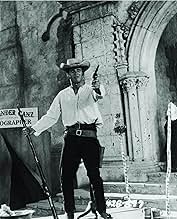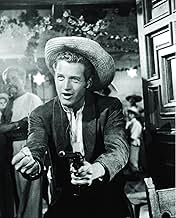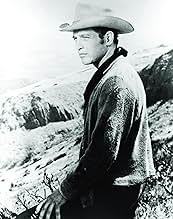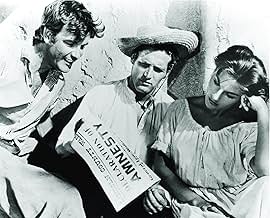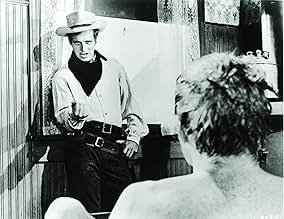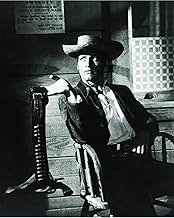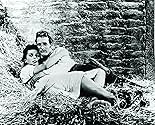NOTE IMDb
6,4/10
4,9 k
MA NOTE
Ajouter une intrigue dans votre langueAfter his employer is murdered by rival cattlemen, a troubled and uneducated young cowboy vows revenge on the murderers.After his employer is murdered by rival cattlemen, a troubled and uneducated young cowboy vows revenge on the murderers.After his employer is murdered by rival cattlemen, a troubled and uneducated young cowboy vows revenge on the murderers.
- Réalisation
- Scénario
- Casting principal
- Récompenses
- 1 victoire au total
Robert Anderson
- Hill
- (as Bob Anderson)
Josephine Parra
- Bride
- (as Jo Summers)
Avis à la une
The director of Bonnie & Clyde and Little Big Man is off to a promising start with The Left Handed Gun, his first film. The film stars a young Paul Newman as Billy the Kid. Billy, working as a ranch hand, swears revenge on the four men who ambushed and killed his boss.
That's about it for plot. Newman plays Billy well, portraying a man bent on his mission. One senses that he means well, but his short temper and dark past always get the best of him, even during his friend's, Pat Garrett (John Dehner in a nice performance), wedding.
Unfortunately, Newman suffers from a weak supporting cast and little character development. I found it hard to believe that Billy could develop such a strong bond with his boss in such a short time (although the movie doesn't exactly specify how long). With the possible exception of Garrett, the remaining players are there to fill up the screen.
In short, I wasn't disappointed with this film, but if you want to view a great Western about a man driven by revenge, definitely see John Wayne in The Searchers.
That's about it for plot. Newman plays Billy well, portraying a man bent on his mission. One senses that he means well, but his short temper and dark past always get the best of him, even during his friend's, Pat Garrett (John Dehner in a nice performance), wedding.
Unfortunately, Newman suffers from a weak supporting cast and little character development. I found it hard to believe that Billy could develop such a strong bond with his boss in such a short time (although the movie doesn't exactly specify how long). With the possible exception of Garrett, the remaining players are there to fill up the screen.
In short, I wasn't disappointed with this film, but if you want to view a great Western about a man driven by revenge, definitely see John Wayne in The Searchers.
Billy The Kid has been played on screen by many actors, of whom Paul Newman may have been the most justly famous. So why is his Billy such a drip?
Newman was 33 years old and had managed to make the most of his second chance at screen fame with a solid turn in "Somebody Up There Likes Me," playing a rebellious young boxer. As Billy, though, Newman seems lost as a similar character of sudden impulse. "All I know is how I feel," he says, and that's true whether he's brooding Brando-like over the death of a rancher he just met or dancing up a storm three minutes later. For every scene he plays with his trademark cool, there must be four or five he exaggerates to strange effect.
It's a strange movie with or without him. Celebrated by some as a psychological western, it presents Billy as neither evil nor a sociopath, but rather as tied up by an understandable if extreme need for revenge. There was this guy, you see, who gave Billy a job and then got shot by some corrupt peace officers, and he promised to teach poor Billy to read.
Never mind that Billy doesn't know this guy when the movie starts and he's already dead ten minutes in. Nor that Billy's two partners-in-crime, Tom (James Best) and Charley (James Congdon), have no clear reason for siding with their hot-tempered friend. "The Left-Handed Gun" is a film in a hurry, mainly to give Newman as much opportunity to emote as possible. Boy, does Newman emote!
Compositionally, "The Left-Handed Gun" does some interesting things. We see Billy's first gunfight through a steamed-up window taking place while Billy simultaneously maps it out, a terrific effect. Director Arthur Penn and cinematographer J. Peverell Marley (not a harmonious team, as Penn reveals in a DVD commentary) continually find unique details to capture the eye, like one man's face pressed against a window glass after taking a fatal bullet. In his movie blog "Nothing Is Written," Groggy Dundee points out just how much of Penn's big escape scene made it into the later Sam Peckinpah movie "Pat Garrett And Billy The Kid," to the point of identical blocking and camera angles.
This is a better film that that one, which is overlong and cattywampus. Penn makes a point in his DVD commentary about the film being taken away from him in the editing room, and there's much sloppiness in evidence in the final cut, like Tom taking the same bullet in two consecutive scenes. But Penn must take the blame for a cast that overplays way too much, as if Newman's Method acting style was the swine flu. Best either whacks his hat or giggles constantly, while John Dehner as Pat Garrett has an atrocious scene where he whines at Billy for shooting a guy during his wedding reception.
"This wall, this street, this town, I married all of it," Dehner screams. I shudder to imagine the honeymoon.
Best's future "Dukes Of Hazzard" castmate Denver Pyle sticks out in a better way as the ornery Ollinger, while Hurd Hatfield coos over Billy as an overly florid Southern writer who wants to make his fortune writing up Billy's career. Considering this was based on a play by Gore Vidal, there may be a subtext there, though Hatfield works his few scenes more in the direction of a creepier Vincent Price. I liked him, even if I don't think he got across anything more than a hint of an idea about our exploitative celebrity culture.
That's the problem with "Left-Handed Gun," aiming too high and not getting what it shoots for. That and Newman, who shows some star power here but not much acting skill. Unlike Billy, he had time to get better.
Newman was 33 years old and had managed to make the most of his second chance at screen fame with a solid turn in "Somebody Up There Likes Me," playing a rebellious young boxer. As Billy, though, Newman seems lost as a similar character of sudden impulse. "All I know is how I feel," he says, and that's true whether he's brooding Brando-like over the death of a rancher he just met or dancing up a storm three minutes later. For every scene he plays with his trademark cool, there must be four or five he exaggerates to strange effect.
It's a strange movie with or without him. Celebrated by some as a psychological western, it presents Billy as neither evil nor a sociopath, but rather as tied up by an understandable if extreme need for revenge. There was this guy, you see, who gave Billy a job and then got shot by some corrupt peace officers, and he promised to teach poor Billy to read.
Never mind that Billy doesn't know this guy when the movie starts and he's already dead ten minutes in. Nor that Billy's two partners-in-crime, Tom (James Best) and Charley (James Congdon), have no clear reason for siding with their hot-tempered friend. "The Left-Handed Gun" is a film in a hurry, mainly to give Newman as much opportunity to emote as possible. Boy, does Newman emote!
Compositionally, "The Left-Handed Gun" does some interesting things. We see Billy's first gunfight through a steamed-up window taking place while Billy simultaneously maps it out, a terrific effect. Director Arthur Penn and cinematographer J. Peverell Marley (not a harmonious team, as Penn reveals in a DVD commentary) continually find unique details to capture the eye, like one man's face pressed against a window glass after taking a fatal bullet. In his movie blog "Nothing Is Written," Groggy Dundee points out just how much of Penn's big escape scene made it into the later Sam Peckinpah movie "Pat Garrett And Billy The Kid," to the point of identical blocking and camera angles.
This is a better film that that one, which is overlong and cattywampus. Penn makes a point in his DVD commentary about the film being taken away from him in the editing room, and there's much sloppiness in evidence in the final cut, like Tom taking the same bullet in two consecutive scenes. But Penn must take the blame for a cast that overplays way too much, as if Newman's Method acting style was the swine flu. Best either whacks his hat or giggles constantly, while John Dehner as Pat Garrett has an atrocious scene where he whines at Billy for shooting a guy during his wedding reception.
"This wall, this street, this town, I married all of it," Dehner screams. I shudder to imagine the honeymoon.
Best's future "Dukes Of Hazzard" castmate Denver Pyle sticks out in a better way as the ornery Ollinger, while Hurd Hatfield coos over Billy as an overly florid Southern writer who wants to make his fortune writing up Billy's career. Considering this was based on a play by Gore Vidal, there may be a subtext there, though Hatfield works his few scenes more in the direction of a creepier Vincent Price. I liked him, even if I don't think he got across anything more than a hint of an idea about our exploitative celebrity culture.
That's the problem with "Left-Handed Gun," aiming too high and not getting what it shoots for. That and Newman, who shows some star power here but not much acting skill. Unlike Billy, he had time to get better.
Billy the Kid seeks revenge for the murder of his employer. This oft-told tale gets the psychological treatment in this account based on a play by Gore Vidal. Newman replaced first choice James Dean, and seems to be doing a Dean impression of the misunderstood youth, along the lines of "Rebel Without a Cause." Since Newman was rarely guilty of overacting, the blame here must fall on Penn, directing his first film after years of "playhouse" work on TV that encouraged exaggerated acting. Furthermore, the film is choppy and drab looking. Penn of course got better with experience. The biggest joke is that Billy the Kid was actually right handed.
This Film has Many Interesting Elements that may Attract Viewers. Director Arthur Penn's Debut, Early Paul Newman as an Iconic Western Outlaw, and a Different Artistic Approach to the Conventional Western.
However, the Movie is not the Easiest to Like. Penn's Flourishes are Welcome in a Genre so Ripe with Regularity, but Newman Overacts to the Point of Silliness and can Grate on the Nerves.
In Fact, just about Every Actor Emotes to Extreme, Except Perhaps John Dehner as Pat Garrett who Strikes a Concerned Lawman's Pose Quite Well Without Words. But even He is Guilty of One Scene that is Downright Atrocious (the this is my wedding, this is my town part).
Visually the Film has Many Interesting Shots and Flourishes, but Newman's Exaggeration of Body Language and Other Fanciful Displays that Misfire bring the Movie Down to just Above Average. There is Enough Curiosity here that is Worth a Watch, but Overall it is the Over Baked Acting that makes this a Disappointment.
However, the Movie is not the Easiest to Like. Penn's Flourishes are Welcome in a Genre so Ripe with Regularity, but Newman Overacts to the Point of Silliness and can Grate on the Nerves.
In Fact, just about Every Actor Emotes to Extreme, Except Perhaps John Dehner as Pat Garrett who Strikes a Concerned Lawman's Pose Quite Well Without Words. But even He is Guilty of One Scene that is Downright Atrocious (the this is my wedding, this is my town part).
Visually the Film has Many Interesting Shots and Flourishes, but Newman's Exaggeration of Body Language and Other Fanciful Displays that Misfire bring the Movie Down to just Above Average. There is Enough Curiosity here that is Worth a Watch, but Overall it is the Over Baked Acting that makes this a Disappointment.
Like the precedent user said,all that will follow in Penn's best works is already here:the search of a father,the marginal hero,incapable of becoming part of a community.In "Miracle worker", which I look upon as his masterpiece,Helen's father is thoroughly unable to communicate with his daughter who immures herself in her autism.In "the chase" Robert Redford's character has been an outcast for his whole life.In "Bonnie and Clyde" ,not only Penn depicts par excellence marginal characters but he also introduces CW Moss's character ,whose father is a mean old man,and who loves the two gangsters as his parents.
At the beginning of the movie ,Billy is still a boy searching for his identity.His boss,who reads him the Bible ("through a glass,darkly"),gives him what he's longing for.One must notice that the relationship Billy/his boss-father is too short on the screen to be really convincing.This is accentuated by the fact that the supporting cast is faceless,and once his "dad" is dead,Newman carries the movie on his own:his performance is typically "actor's studio",very deep,very introspective,in a nutshell he plays Billy as he would play a Tennesse Williams character.We're far from the western actor,such as John Wayne or Joel McCrea.The sentence "I do not want you" often comes in the lines and drives Billy to despair and violence.Actually it's the last sentence he hears from the man he loves so much.
Because they have no shoulder to lean on,Penn's heroes are doomed oedipean human beings and except for Helen in "Miracle worker",their destiny leaves them no hope.
At the beginning of the movie ,Billy is still a boy searching for his identity.His boss,who reads him the Bible ("through a glass,darkly"),gives him what he's longing for.One must notice that the relationship Billy/his boss-father is too short on the screen to be really convincing.This is accentuated by the fact that the supporting cast is faceless,and once his "dad" is dead,Newman carries the movie on his own:his performance is typically "actor's studio",very deep,very introspective,in a nutshell he plays Billy as he would play a Tennesse Williams character.We're far from the western actor,such as John Wayne or Joel McCrea.The sentence "I do not want you" often comes in the lines and drives Billy to despair and violence.Actually it's the last sentence he hears from the man he loves so much.
Because they have no shoulder to lean on,Penn's heroes are doomed oedipean human beings and except for Helen in "Miracle worker",their destiny leaves them no hope.
Le saviez-vous
- AnecdotesPaul Newman was widely felt to be miscast as Billy the Kid since at 33 he was considerably older than the character. Billy was supposed to be 18 at the beginning of the film.
- GaffesThe film is about western outlaw Billy the Kid, who was actually right-handed.
- ConnexionsFeatured in Legends of the West (1992)
Meilleurs choix
Connectez-vous pour évaluer et suivre la liste de favoris afin de recevoir des recommandations personnalisées
- How long is The Left Handed Gun?Alimenté par Alexa
Détails
- Date de sortie
- Pays d’origine
- Langues
- Aussi connu sous le nom de
- The Left Handed Gun
- Lieux de tournage
- Sociétés de production
- Voir plus de crédits d'entreprise sur IMDbPro
Box-office
- Budget
- 700 000 $US (estimé)
- Montant brut mondial
- 5 066 $US
- Durée1 heure 42 minutes
- Couleur
- Rapport de forme
- 1.85 : 1
Contribuer à cette page
Suggérer une modification ou ajouter du contenu manquant



